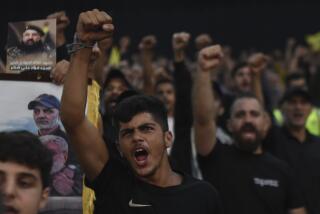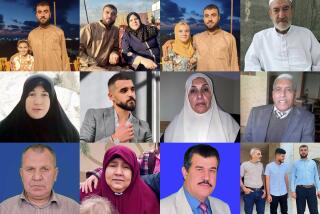INTIFADA / A CONTINUING TOLL : Palestinians Kill Own Countrymen for Collaboration : It is now riskier to be suspected of aiding Israel than to protest against occupation.
- Share via
JERUSALEM — Ahmed Shaki, whose son Yassin was beaten to death on suspicion of informing for the Israeli army, has been waiting in vain for the killers to apologize.
Shaki maintains that his son was a victim of mistaken identity and that, if his Palestinian executioners would just admit so, it would clear up a blot on the family’s history.
“Just a letter would do,” pleaded Shaki, who lives in the crowded valley neighborhood of Silwan outside Jerusalem’s Old City under the shadow of the golden Dome of the Rock, one of Islam’s best-known mosques.
But in the darkened atmosphere of an uprising torn by internal conflict, hardly anyone says he is sorry--and it will probably never be known whether the 20-year-old Yassin was an informer.
Comparatively Risky
The killing of collaborators is becoming so commonplace that in July and August it was riskier for a Palestinian to be suspected of working for the Israelis than to engage in protests against the Israeli occupation of the West Bank and Gaza Strip.
Palestinians killed up to 13 of their own in July and 12 in August, according to several accounts. Although the reason for the bloodshed was inevitably given as collaboration, the rationale sometimes seemed to be a flimsy veneer for settling personal accounts.
Israeli soldiers shot and killed three Palestinians during all of July and only one in August--the lowest total by far in the 33-month-old Palestinian uprising. In all, more than 250 Palestinians have died at the hands of other Palestinians; more than 660 Palestinians have been killed by Israelis--mainly by troops, but a few by civilians. Forty-seven Israelis have died.
With its fog of suspicion and half-understood enmities, the Yassin Shaki case is typical of the current wave of intra-Palestinian killings in the intifada, as the uprising is called in Arabic. Shaki, a gardener employed at Hebrew University, had no enemies, his family insisted. Yet at least half the masked young men who came to kill him were from Silwan and appeared to know him, his father recalled.
Yassin Shaki was questioned and beaten by the gang and returned home, but even with this warning he did not flee. Flight would be viewed as an admission of guilt. A rumor spread that during a brief stint in jail he was somehow enticed into informing for the Israelis; even that failed to scare him into hiding.
In Silwan, arrests of Palestinians by the Israeli army may have indirectly led to Yassin Shaki’s death. When, on July 22, masked men came to his house to take him for the last time, were they really convinced that he was a spy or were they just blindly hitting out at the unseen hand of Israeli intelligence?
“They could not get to the real guilty people, so they took my son,” Ahmed Shaki said. The son died of internal bleeding caused by repeated kicks in the belly.
Killings such as this have spurred urgent activity by public spokesmen for the uprising. Some try to play down the killings as lamentable but inevitable: Under occupation, they point out, Palestinians are not allowed to install any kind of law enforcement.
“What is really surprising is that there is not complete anarchy,” said Ibrahim Karaaim, director of the Palestine Press Service in Jerusalem, which often reflects the opinions of the Palestine Liberation Organization, the declared Palestinian leadership-in-exile.
“I’m not trying to justify this, but you have to differentiate between the majority of the population and radicals who have different ideas,” Karaaim said. “It is a problem for us because the whole world is waiting for the Palestinians to make mistakes.”
Internal Ill Seen
Other Palestinian observers view the killings as less of a public relations problem and more of an internal ill that is draining the energies of Palestinians away from fighting the Israelis.
Meanwhile, the intensity of intra-Arab killing is taken by Israeli authorities as proof that terror reigns in the West Bank and Gaza and that no steps can be taken toward Israel’s plan of holding Palestinian elections until calm is restored.
Williams, The Times’ bureau chief in Jerusalem, recently has been on assignment in Baghdad, Iraq.
More to Read
Sign up for Essential California
The most important California stories and recommendations in your inbox every morning.
You may occasionally receive promotional content from the Los Angeles Times.













